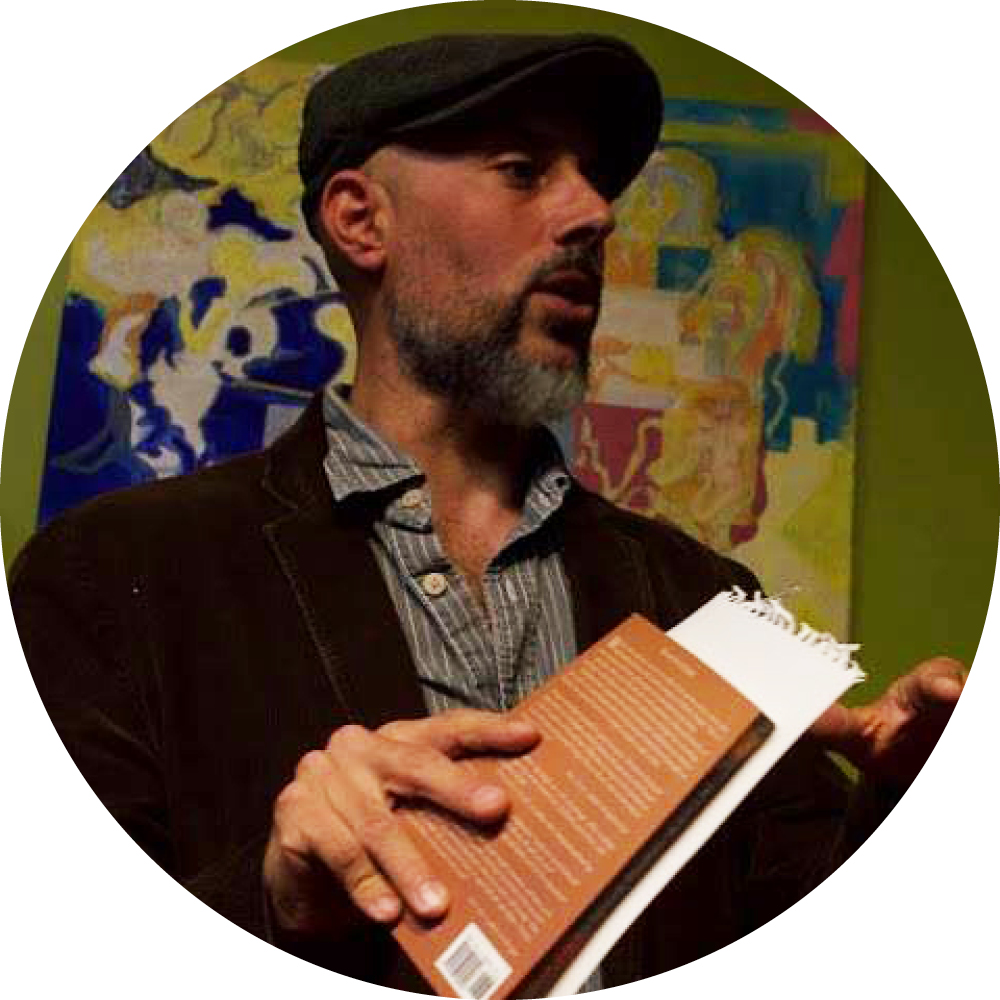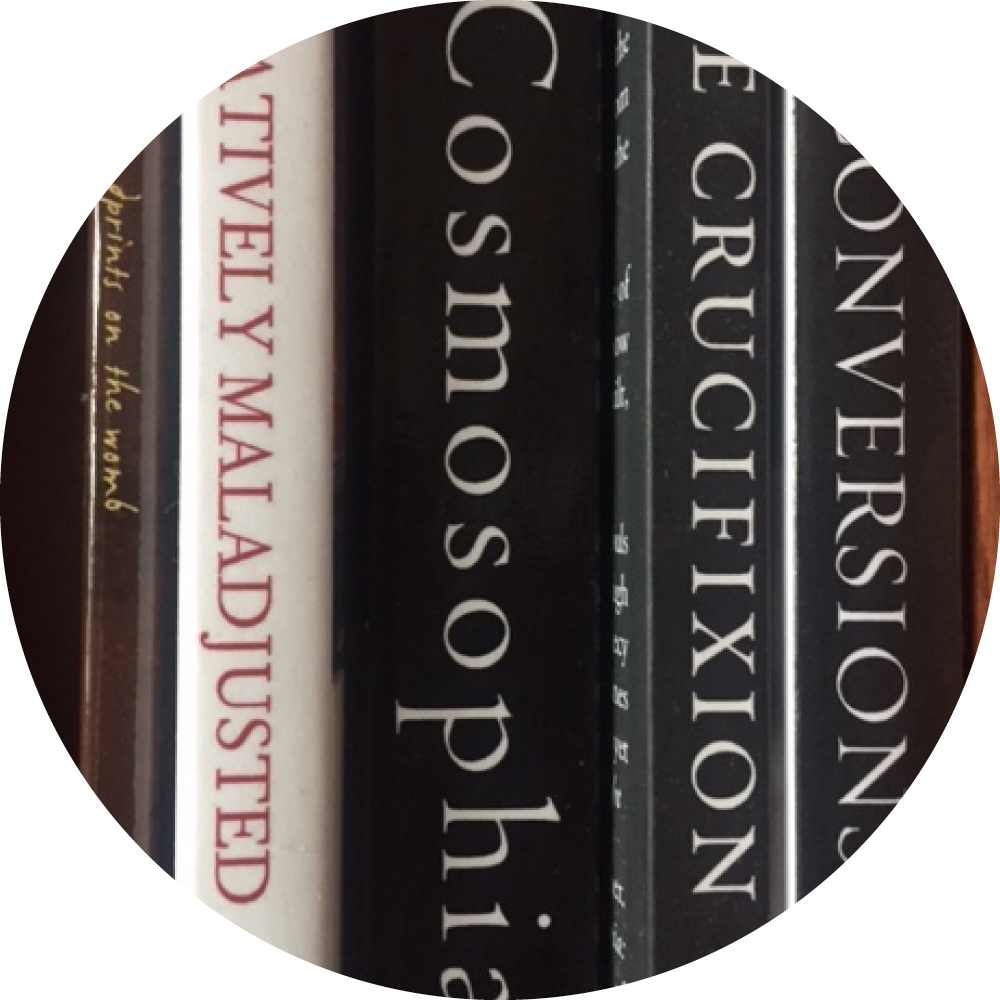Letters to
Edward Abbey
By Burt Bradley
The environmental writer Edward Abbey (1927-1989) was and still is one of my literary/cultural heroes who “fought the good fight” through his unabashed candor, his courage, his passionate conservation ethos, and satirical humor in his defense of our planet (often against government bureaucracies) and the Southwest (nicknamed Abbey Country) in particular, where I have sojourned many times in the last two decades guided by his firsthand knowledge (in Desert Solitaire and The Monkey Wrench Gang) of the truth and beauty of the wilderness and celebration of the human spirit.
Spring Break
San Juan River
Dear Abbey,
You should see the moon tonight, a lopsided egg laid in the golden middle of night. It looks ready to break on the black ridges of sandstone cliffs that seem to hold this river like a pet snake in its rough embrace. Anasazi land. Ancient land. The ghosts have flesh and form here. Scratched into red rock. Psychedelic creatures of wobbly bodies, vined limbs, and balloon heads. I bet if I had the guts to hike back to those petroglyphs, I’d see them dancing in the moonlight. Singing, too. Gravel throated, songs of light, of corn, of Kokopelli erections and Changing Woman’s laughter.
There’s a sensibility here. An attitude that one adopts or is adopted by. You can see it being picked up by the students. Gradually, they’ve become more generous. Their suburban apathy has been transformed (Changing Woman at work) into a willingness to be here. To not resist responsibilities, chores, duties, whatever is necessary. Yes, there’s still plenty of teenage fun, tee-hee in the tents, sunburned backs, splashing water. Yet there is, also, a very slowly growing sense of camaraderie and easy communication. I wouldn’t say it has reached that special silent communication that occurs among people who have worked and lived together in close quarters. That takes time and space, primitive time or primary time and space – that tribal, intimate or innate understanding among folks based on body language and knowing the task at hand: camp cooking, setting up a tent, gathering wood, rigging the rafts.
They already grasp the dangers of the worst way to be in the wilderness: greedy or what Gary Snyder refers to as stinginess. I don’t see any of that. I understand Snyder’s concept. Greed in this environment is nihilistic and a threat. Of course, in any environment, but it serves no purpose here where selfishness traditionally leads to conflict, and self-absorption or arrogance leads to death.
Again, Snyder has it right: the fire brings us all home in an odd way. Sunlight amplifies our individual traits. Who rows more efficiently? Who clowns around? Who ripples muscles and flirts? Who oils her tan? But it is the night, the moon that brings us together. And the fire. The skinny cottonwood limbs, the chill at our backs, the guitar and old songs we haven’t sung since we were kids. Tribal. For a short time. The desert. The sand, the dust, the sunlight leaping across the muddy river. The whippoorwills and ravens. The coyotes especially, the ancient ones singing in the night and you, old gruff, running with them beneath this sphere of gold light.
In Restless Peace,
B.
Off the Road,
Moab, Utah
Dear Abbey,
I’ve got no problem here, Ed. Thank God, you’re not an advice columnist. Right now, it’s about light everywhere transfiguring this country of rock. Sandstone light. Utterly still, fragile yet uncompromising. It doesn’t care about the temperature or the lizards or the four wheelers or me – all equal, all deserving. It blesses us all. How is that possible? Can the land be so forgiving? If I was to personify it, I’d say it is Avalokiteshvara, the Bodhisattva of Compassion, who will not pass into nirvana without bringing the rest of us.
Let me put it another way. I just read Rumi. Or I should say dove into Rumi and dissolved, like a single grain of sugar in a cup of hot coffee. A feeling like burlap overwhelms me: coarse, sturdy, earthen. There’s no hierarchy here. The world without seams, unfixed, like the waves of this blond silt blowing across the desert, or that snake, sidewinder, sliding down a slope, half-wind, half-whip braiding the dunes: the Beloved is everywhere, yes?
In Restless Peace,
B.
13th Friday, March,
San Juan River
Dear Abbey,
Well, Ed, I made it back to your country. I’m way past Moab though, but still in your neck of the woods. San Juan River to be exact, about nine miles from Mexican Hat. Wind, Ed, wind like something out of Biblical times. No fire in it, no voices either. But pure Coyote in its flipping of his tail at us, digging up sand, kicking it in our faces, in our boats, in our desires to get to our campsite. Oh, he’s still here. The rascal thought sand in our food would be fun and right now as I write, he’s barking around my tent in great Coyote gusts.
But, Ed, the world’s dying here. The San Juan silting up. It’s gasping for oxygen and I don’t know what to do. We may be its last lovers. Our boats kissing its rocks, caressing its liquid skin. She’s old and tired. I think that’s why Coyote helped. He didn’t want us to take her for granted, and we didn’t, and don’t. I’m listening to her now rage, rage, rage against the dying of the light. The eight-foot rapids they’re called. We’re camped just above where they are roaring like a grizzly bear, even Coyote can’t out yelp her here. But her roar is a death rattle. Her throat filling with silt, a hundred feet since the tumorous growths, the Glen Canyon and Navajo Dams. Her gradient, a glorious barbaric yawp of river falling eight feet per mile now murmurs a mere half foot.
I don’t know what to do, Ed. Monkeywrench big time, blow up the dams? Me? A skinny-assed, obscure poet. I don’t even have a poem for the cause, only this liquid heat in my heart, this fierce pulsing light of the Anasazi land. I will carry it home, a flame to hand to my daughters. Let it burn in their hearts, melt them into river nymphs, Rhine Maidens, to guard the gold (the water itself) from the evil dwarves and greedy gods, whom you identified as “our neo-conservatives who neither new nor conservative, but old as Babylon and evil as Hell.”
Hayduke Lives!
In Restless Peace,
B.
October 30
Devil’s Tower
Dear Abbey,
I don’t know if you ever got up this way, but, man, this is one hell of a rock (pun intended). A little like the Rock of Gibraltar without all the saltwater and somewhat like the Rock of Ages; it’s got that much wakan, spirit, as the natives would say. None of them, by the way, called it anything so white and Halloweenish as the devil anything. You know that’s our Puritan bunch at it again. If we can’t kill something or ride it or rip it up to get (always with the getting, begetting: check Genesis and Wal-Mart) yellow shiny stuff or black shiny stuff, what’s the difference, we want it even if it ain’t nothing but something others have, not us.
Anyhow, if the Caucasian clan can’t get it under their control, it gets under their skin and they call it a hellish thing: the devil, red devils, heathens, savages, Devil’s Tower. Oh forget about the locals naming it a long time before white Americans stumbled across it: Mato Tipila, Bears Lodge, Bear Tipi, Bear’s Lair. Forget, too, about those so-called “heathens” own sacred stories about princesses being chased by a giant bear to this spot and praying to the earth for help (not to have dominion over), and the earth rising up as the bear clawed the sides and the seven pretty little girls having fulfilled their calling in this life (how many of us do?) continued to ascend into genuine stardom to become the Seven Sisters of the Pleiades.
I saw them last night, all seven, bejeweled, holding dark hands and dancing the Jingle Dance the girls at powwows perform to earn money for college. Anyhow, the Rock, Ed, if there’s a point to this life, here it is in the earth’s hard flesh, so to speak. Hell (my last pun I swear), it’s so simple, you know as any blessed Fool would know. The first truth we knew in our mother’s womb and that which the first people here lived their whole lives. The ancient Vedic wisdom right here: Sohum, I am that, that I am.
In Restless Peace,
B.
(for Scott Feyhl)
March 5
Grand Canyon
Dear Abbey,
By God or Gaia, we have arrived. Ground zero of being, the belly of the great Mother herself. Her hard-ribbed, colossal cavity, open to the whole world. But only a few of us find our way back to the womb. Here her cold, vital blood runs wild, wide-arteried, hard-veined, gushing as if her first awful children were being birthed all over again: Giants, hundred handed, and gargantuan Titans rumbling over her body.
I can see why now old John Wesley Powell suddenly got religion, naming everything by every deity he could think of: Brahma’s temple, Vishnu’s schist, Zoroaster’s Granite, Jacob’s Ladder, the Devil’s corkscrew, and Bright Angel. The eternal forces of dark and light not fighting but combining in the same rock formation.
Here at the source, the Colorado, the godalmighty liquid heart of the Grand Canyon, I am barely able to contain myself. My head bumping against this billion lighted night. This far down, this far back in time, lying in her primordial arms, magna mater, great mother. I’m a child, again, of this earth.
In Restless Peace,
B.
March 10
Grand Canyon
Dear Abbey,
Isn’t this the way it’s supposed to be? Lugging one’s bag of skin to the bottom of the Grand Canyon. Perching myself atop a rock outcropping of Vishnu’s schist and Zoroaster granite surrounded by acolytes of prickly pear cactus, Mormon tea, and Joshua trees. Here along the rough wall banks of the Colorado, flowing green chartreuse, and wide as the sky.
How could anyone not feel insignificant? And yet there is the paradox inherent to all sacred space. That, despite the physically obvious, being no more than a tuft of cottonseed against such a backdrop, I feel big as one of those giant Buddhas carved into the stony Afghanistan mountainside. And still big, even after being blown to smithereens by Taliban zealots, big as the whole world, visible and invisible, forever outlasting petty regimes and puny thousand-year-old dynasties, and all the lost and forgotten gods and their minions. No doubt, you saw right away my question was a rhetorical one, needing no answer, but being here.
In Restless Peace,
B.
About The Author
Burt Bradley
Burt Bradley received a Ph.D. in English from SUNY, Stony Brook where he was a Lewis Mumford Fellow. He has published poetry, fiction, and non-fiction. His book, After Following, won the 2018 Homebound Publications Poetry Award. Other writings have appeared in Ring of Fire: Writers of the Yellowstone Region, Michigan Quarterly Review, Best of Writers at Work, among others. A forthcoming book of poetry, Letters to Michelangelo from Wyoming (with drawings by John Giarrizzo) will be published in April, 2021. Bradley is a professor emeritus at Northwest College in Powell, Wyoming, where he taught Writing in the Wild classes in Yellowstone National Park and the Southwest Desert.
Re-sources
Re-Imagining Education

Empowering educators to take a deeper look at the stories told in our schools and to re-imagine them in transformative and
nurturing learning spaces.
Learning Opportunities

Classes, workshops, and lectures that help to empower people to re-imagine who they are and their place in the world.
Get Involved

Help the Chicago Wisdom Project realize its mission to re-imagine education through holistic programming that transforms individual, community and world through creative expression.
